E-learning in Africa is a dream that becomes reality now.
Think of all the opportunities for e-learning arising from increases in affordable internet access.
E-learning, online courses and other aspects of e-learning technology have the potential to enhance education provision in Africa in numerous ways.
From raising literacy levels in poor rural areas where education infrastructure is lacking to complementing the existing courses at Africa's top universities, remote learning using educational technology is flexible and very versatile.
Deploying case studies and statistics from a variety of sources, this article gives you an in-depth overview of the ways in which affordable internet access is improving in Africa and suggests ways to seize the opportunity to improve education across the continent.
Let’s dive in.
Educational technology (edtech) is defined by the Association for Educational Communications and Technology as “the study and ethical practice of facilitating learning and performance by creating, using and managing appropriate technological processes and resources.”
Distance education encompasses both the technological resources and educational theory used to improve learning outcomes.
The use of technology to facilitate learning has increased immensely worldwide in recent years. Educators can access tools such as electronic learning, online courses and multi-media lessons to provide students with access to information.
Electronic learning (elearning, e-learning, E-learning) is just one of the component of edtech. The term has been used since the late 1990’s and refers to the use of electronic devices such as computers in learning situations such as online courses, multimedia presentations or interactive classrooms.
E-learning has evolved over the years and now includes terms such as mobile learning or m-learning which refers to learning via hand held mobile devices such as smart phones, tablets and electronic notebooks.
E-learning is increasingly being used to reach students who have little to no access to traditional bricks and mortar schools.
See also: Advantages of studying online
This is of particular relevance in Africa where, according to UNESCO, 30 million primary-age children are not attending school due to reasons such as lack of school fees, pandemics, dropping out scenarios, lack of interest to attend school and so forth.
With a more recent trend which has seen the emergence of Massive Open Online Courses, with open access and unlimited participation available via the web, e-learning can effectively bridge that gap in marginalized communities.
With its many upsides, a good number of MOOCs provide interactive user forums and encourage interaction between students and lecturers.
Who can benefit from the much needed e-learning?
E-learning is an incredible resource and its use extends far and beyond the traditional teacher-student relationships.
E-learning can be a mechanism for delivering educational material, including university level courses, classroom aids and as a way of enhancing employees professional development.
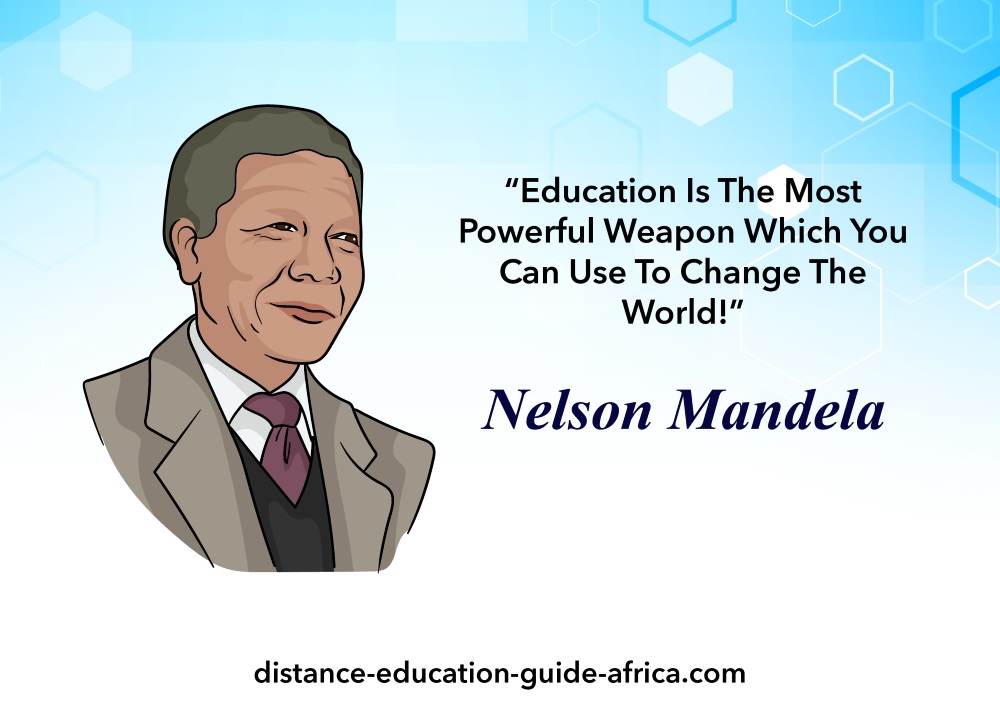
Education Is the most powerful weapon which you can use to change the world! (Nelson Mandela)
You might be wondering:
Africa is perfectly situated to embrace the opportunities the e-learning revolution provides. Smart phone usage is skyrocketing, internet access has improved and the technology has become more affordable.
Internet access in Africa varies from one country to the other, with a high percentage of internet users in a given country's population in some areas of Sub-Sahara Africa falling well below half.
Let’s take some figures to get a better feeling for the internet access in various African countries. The internet penetration as percentage is (as of March 2020):
- Kenya: 87%
- Nigeria: 61%
- South Africa: 55%
- Ghana: 38%
- Ethiopia: 17%
It is clear that internet access levels in Africa vary widely from country to country, and hence the edtech solutions such as MOOC and online courses ought to be tailored in a way that reflects the number of people per region pursuing e-learning.
However, one thing is pretty much consistent throughout the continent, and that is the fact that affordable internet access is improving.
Recent GSMA statistics show that the mobile internet connectivity is permanently rising (see mobile internet connectivity SSA fact sheet). “According to consumers, the two largest barriers to mobile internet adoption in Sub-Saharan Africa are a lack of digital skills and literacy followed by affordability.”
Forbes describes this situation with the article “Africa is the next frontier for the internet”.
Here’s the deal:
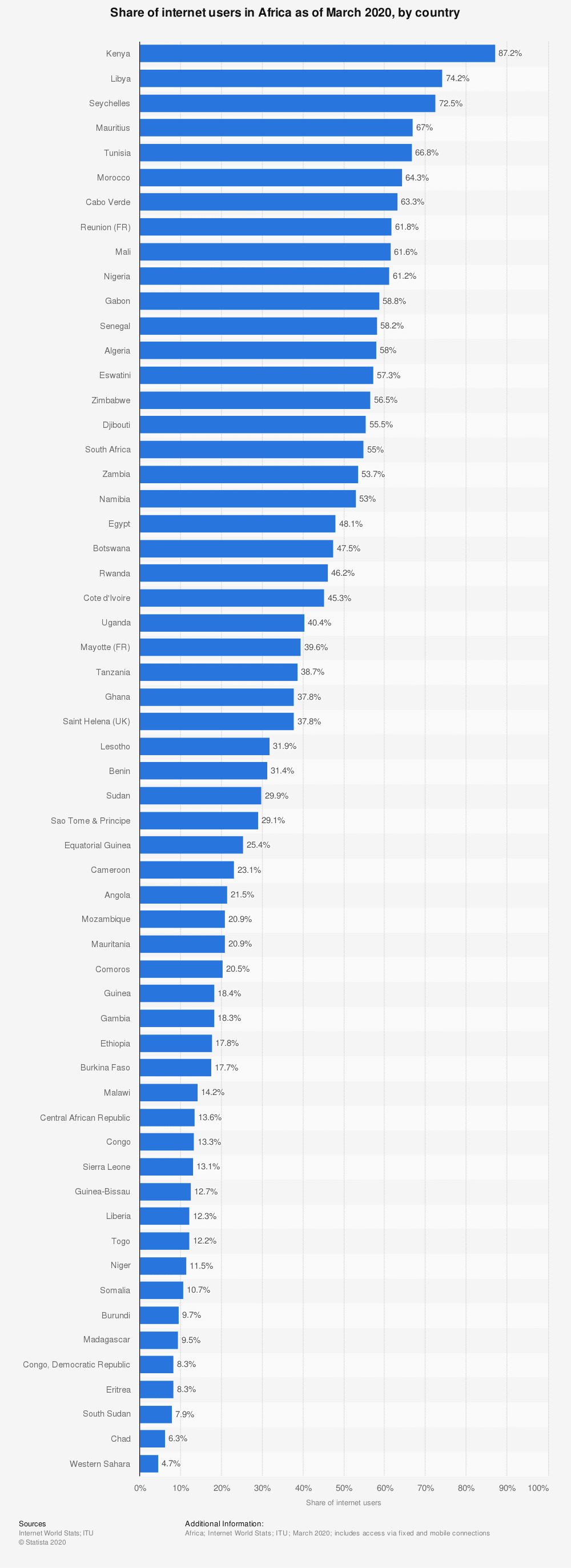
It is extremely important to contemplate the advantages and disadvantages of e-learning.
This will ensure that you will be ready to address the various challenges of e-learning and be in this innovative era and that you will be able to make the best of all the new possibilities that come with it.
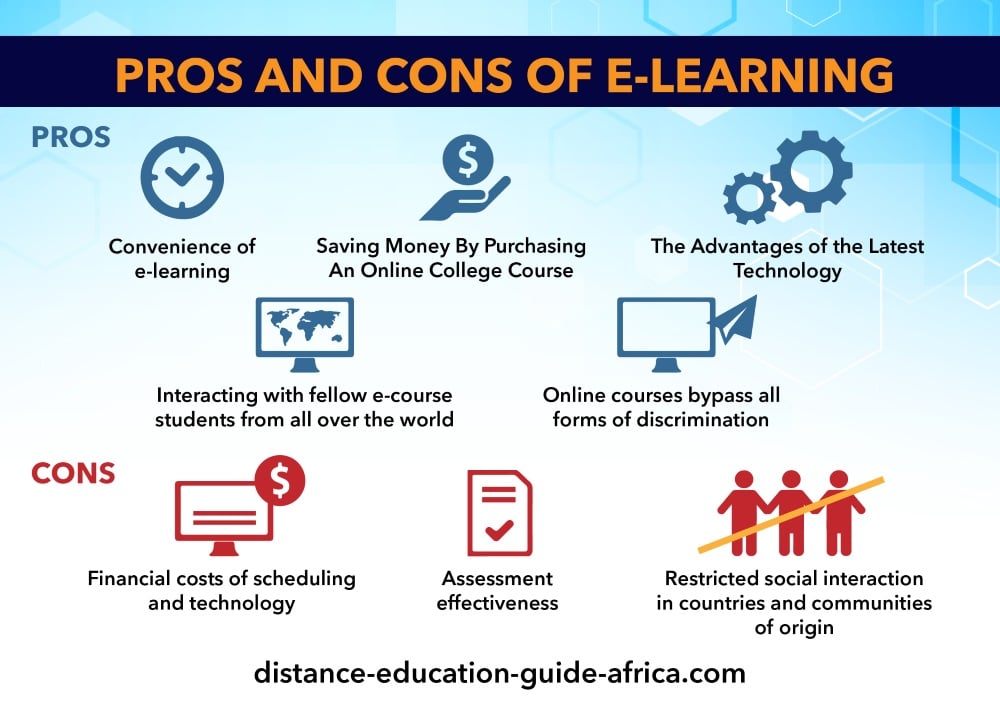
E-learning courses have the potential to be hugely successful if the learner is motivated and has an independent outlook, an organized mindset and is self-disciplined.
Excellent time management skills are also key in making elearning successful in Africa.
There are three main advantages to this form of e-learning: the convenience, the greatly reduced cost and the lowered access hurdles!
In addition, there are the points in favor of e-learning in Africa:
- Convenience of e-learning,
- Saving Money By Purchasing An Online College Course,
- The Advantages of the Latest Technology,
- Interacting with fellow e-course students from all over the world,
- Online courses bypass all forms of discrimination,
- Introverted students are well suited to online courses, and
- Synergy: excellent level of engaging interaction between the learner and the professor, in addition to the dynamic interaction between online course learners
If a student is not motivated, does not have an independent outlook, is poorly organized and is not self-disciplined, then they will not find this mode of studying helpful. Apart from self, there are here are three main disadvantages to this form of e-learning:
- Financial costs of scheduling and technology,
- Assessment effectiveness, and
- Restricted social interaction in countries and communities of origin
Let’s have a look on previous experiences of e-learning in Africa by studying the situations in Ghana and in South Africa.
A recent paper by Marfo and Okine (2010) shows that 98.35 % of people at Kwame Nkrumah University of Science and Technology (also known as KNUST) agreed that elearning would improve their university experience.
KNUST is a great case study because it illustrates how e-learning can be implemented in a variety of ways. The online platform Moodle was used to gather resources for class and to educate staff on how to send students group emails and announcements.
At the same time, plans are being made to develop courses which can be delivered through remote learning. This goes a long way in enabling students especially ones who’ve been let down by inadequate or poor transport infrastructure. Additionally, the plans will enable differently abled students who are not always well catered or thought of when infrastructures of learning are being built.
Another example of e-learning and edtech in Africa is the extensive use of language diplomas which are offered in Nigeria. Via mobile learning, students can study, be tested, and receive their diplomas through online platforms.
There are a number of e-learning providers in South Africa, including schools, universities, non-profit and business enterprises.
Established universities such as the University of Cape Town, Stellenbosch University and Wits University deliver online courses through the MOOC platform. These courses are locally produced and provide an African context.
MOOC SA is an online college with many free courses. The college acts as a collection of free courses produced by professionals in the region and elsewhere. Its focus is on providing free education, not necessarily on achieving a qualification.
Government commitment to elearning is evidenced by the Western Cape Education Department’s e-learning Game Changer Strategy. Part of this strategy is the development of an ePortal where learners and teachers can access information and digital assets including apps, videos, ebooks and online courses.
Another exciting e-learning initiative emerged in 2016 with the launch of THINK Digital College. This virtual school provides an alternative education system for children which is not only flexible but also cost effective and only requires a smart phone or tablet with access to the internet.
It gets even better:
Meanwhile there is a whole bunch of local providers of e-learning technology in Africa. Some providers focus on K12 education, other concentrate more on the tertiary education sector.
As examples find here a non exhaustive list of regional providers of e-learning in Africa:
Eneza Education (Kenya):
Eneza is the most widely used mobile education platform in Africa with local content. It started with SMS and has released web and smartphone versions.
Rethink Education (South Africa):
Digital plattform which uses mobile chat to deliver short, interactive lessons, especially maths and science.
Prepclass.com (Nigeria):
Prepclass.com provides content relevant to local examinations; offers quick test taking strategies, targeted examination practice, full length tests, topic-specific tests and a computer based training (CBT) experience similar to that of UTME (Unified Tertiary Matriculation Examination) and post-UTME qualifications in Nigerian universities.
Chalkboard Education (Ghana):
Chalkboard Education offers online courses on mobile phones, online and offline.
Ubongo (Tanzania):
Ubongo delivers effective, localized learning to African families at low cost & massive scale.
Ecampus.camp (Ghana):
On-demand preparation for examinations and tests, via a simple user-friendly interface where the student can progress at his or her own pace
eLimu (Kenya):
Digital educational content provider in East Africa and provider of provider of apps for children
Scholar X (Nigeria):
Scholar X provides scholarships for African students.
Student Hub (South Africa):
Student Hub provides online courses with local content
Clock education
Clock education provides a suite of learning tools for higher education
Tuteria (Nigeria):
Tuteria provides the tutors near students.
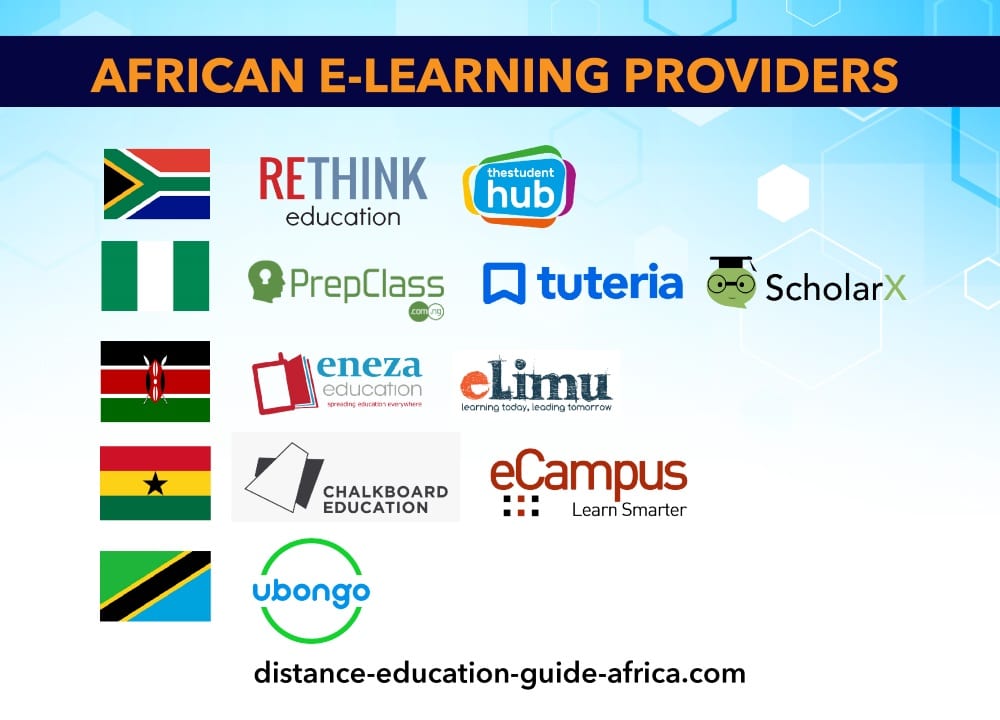
There is a fast growing number of global e-learning providers, but I want to keep it simple.
I list you my three favorite providers and their strengths.
Udemy is the world leading marketplace for all kind of online courses. In addition, the marketplace is very international by offering courses in more than 80 languages.
Coursera is the leading MOOC marketplace by offering courses from the worldwide leading high level universities. You get high quality courses, but it’s expensive.
Online Business School offers fully accredited online undergraduate courses and follow up access to graduate courses of UK universities. You can earn a degree completely online, e.g. an online degree in computer science or in Business Administration and Management.
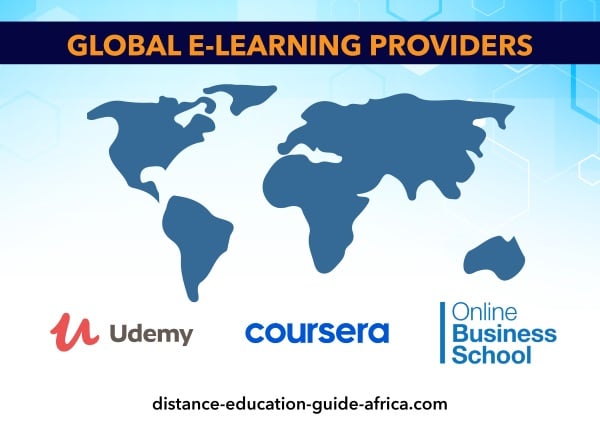
Bill Gates wrote in his 2015 letter to Bill and Melinda Gates Foundation that soon, world class education will just be several taps away, regardless of where anyone lives.
The great news is that online education and e-learning has the power to knock down the geographical barriers to close the skill gap and ensure that everyone in Africa with access to the internet can attain a good education. As seen in other parts of the world, online courses such as an online MBA program, or an online Master’s Program can serve as a stand-alone source for official education if the university or college is accredited by the government of the country in which the learner resides, or in the country where the program has been devised.
This could mean that a brick and mortar US college or university which runs both on-campus programs and e-learning programs, both of which are recognized by the US government have countless online courses which do not require hands on practical work and attending regular classes is not compulsory.
The Global Business School's Network's Chief Executive Officer and an economist, Guy Pfefferman, highlights Africa's negligence towards African higher education in the 2000 UN's Millennium Development Goals. Pfefferman states that the only way to attain this is via e-learning. Clearly MOOC courses, online MBA programs, online Masters Programs, and online graduate degrees are the courses of the future that will help make Africa a thriving and booming economy.
Although it can be said that the term “online” was not particularly appealing some 30 years ago, all that has now changed. The 21st Century is bringing with it high tech internet and computer availability for countless of millions across the continent of Africa.
The latter for example, could mean a brick and mortar US college or a university which runs both on-campus programs and e-learning programs, both of which are recognized by the US government. In such e-distance learning cases, there are no compulsory visits to the brick and mortar institutions. In essence, there are in fact, countless online courses which do not require hands on practical work and attending regular classes is not compulsory.
A few years ago, Sub-Saharan Africa received its initial submarine fibre optic international cable connections. Since then, the continent has had numerous cable systems laid on the east and West African coasts, and every year more countries are becoming connected.
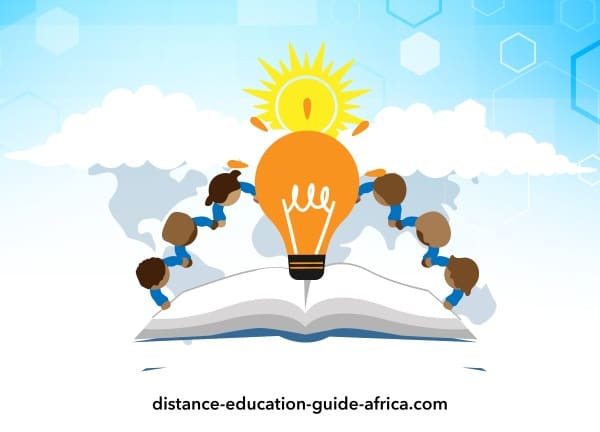
Indeed, e-learning in Africa has a promising future. There is a wealth of resources currently available for students who visit online platforms with a thirst for education.
Although there are many challenges facing education in Africa today (language barriers, culture shock, costs), technology proves to be one part of the solution.
Technology can provide quality educational resources which are accessible to students who cannot access formal schools or universities due to their location or financial status.
If it succeeds, equal quality education for everyone will become a reality.
E-learning, MOOC, online courses and other edtech can be used in various ways across Africa. Many commentators see it as a viable solution to low literacy levels in more rural neighborhoods where transport is underdeveloped.
However, e-learning materials can only be accessed in these communities if both grid electricity provision and mobile phone network coverage and speed are improved. Another way that e-learning, including m-learning, can be implemented in Africa is by integrating it with existing tertiary education structures.
As the case study of KNUST in Ghana illustrates, staff and students alike find that elearning platforms such as Moodle have definitely enhanced their teaching and learning experience. This online model can easily be extended to incorporate more e-learning tools. In hindsight, it can be said that online courses delivered by mobile learning have a brighter future in Africa.
In summary, some online courses can prove to be a magic key which can instantaneously unlock an unending spectrum of education in countless subjects to millions of young minds of the African people.
Whether an individual wants to take a short course, or build on qualifications and skills which they already have, by taking an online MBA, or an online undergraduate course with an acknowledged degree, high quality online courses from reputable universities, colleges and other institutions, are the answer to giving many a chance to education, improving their lives by finding employment or becoming netpreneurs.
Moreover, collectively, the anticipated surge in online learning is very likely to make Africa far more prosperous, and to raise the standard of living for both men and women alike. The flexibility of online learning such as studying for an online MBA program, makes it easier for both male and female learners to work around their family commitments and work duties.
The trade-off for this form of education is realistic, particularly as African students are generally restricted to a low budget and do not always have regular access to education.
Furthermore, there is a rapidly growing internet and mobile phone penetration in Africa which is of great benefit to students and netpreneurs.
Unlike many countries in the Western world, most African communities and families are relatively close, and even if individuals wants to study and has the necessary funds, leaving their families and responsibilities is sometimes next to impossible.
In such instances, e-learning comes in handy.
Now it's your turn
I hope you enjoyed my guide about e-learning in Africa.
Now I’d like to hear what you have to say:
- Did you ever use an online course before?
- Which are your experiences?
- And which provider do you prefer?
Let me know by leaving a comment below right now.
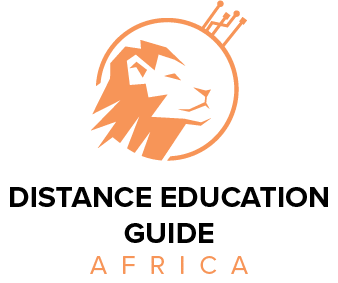
Did you ever use an online course before?
Which are your experiences?
And which provider do you prefer?
I started using online courses in 2017. I enjoyed more this system because it helps me to schedule my daily activities and not be stressed. I also experienced in guiding myself and navigating the different platforms and websites. This taught me how I can learn new skills by myself. I prefer an online business provider.